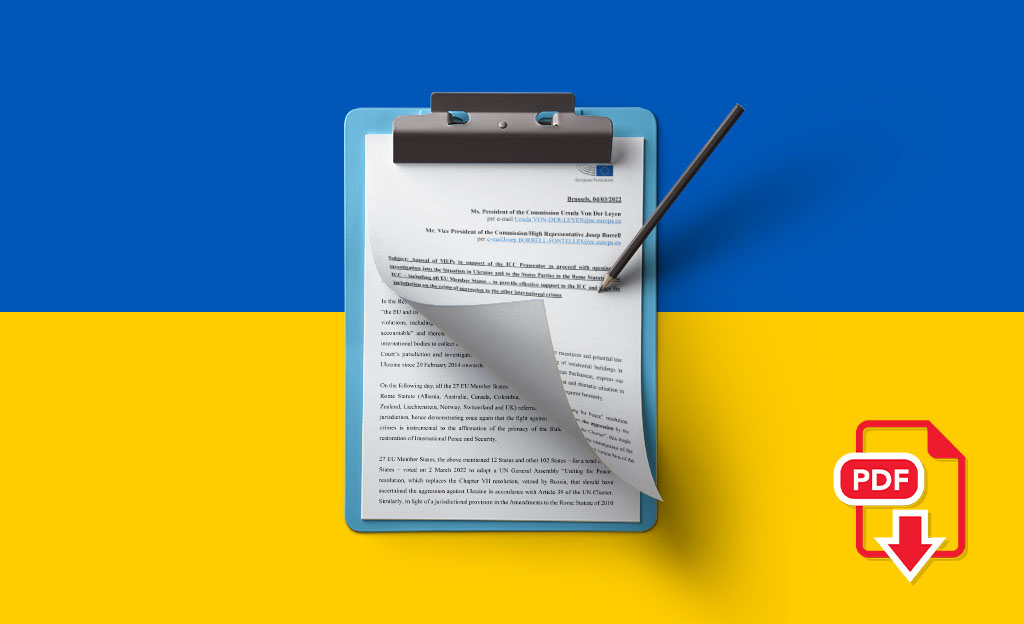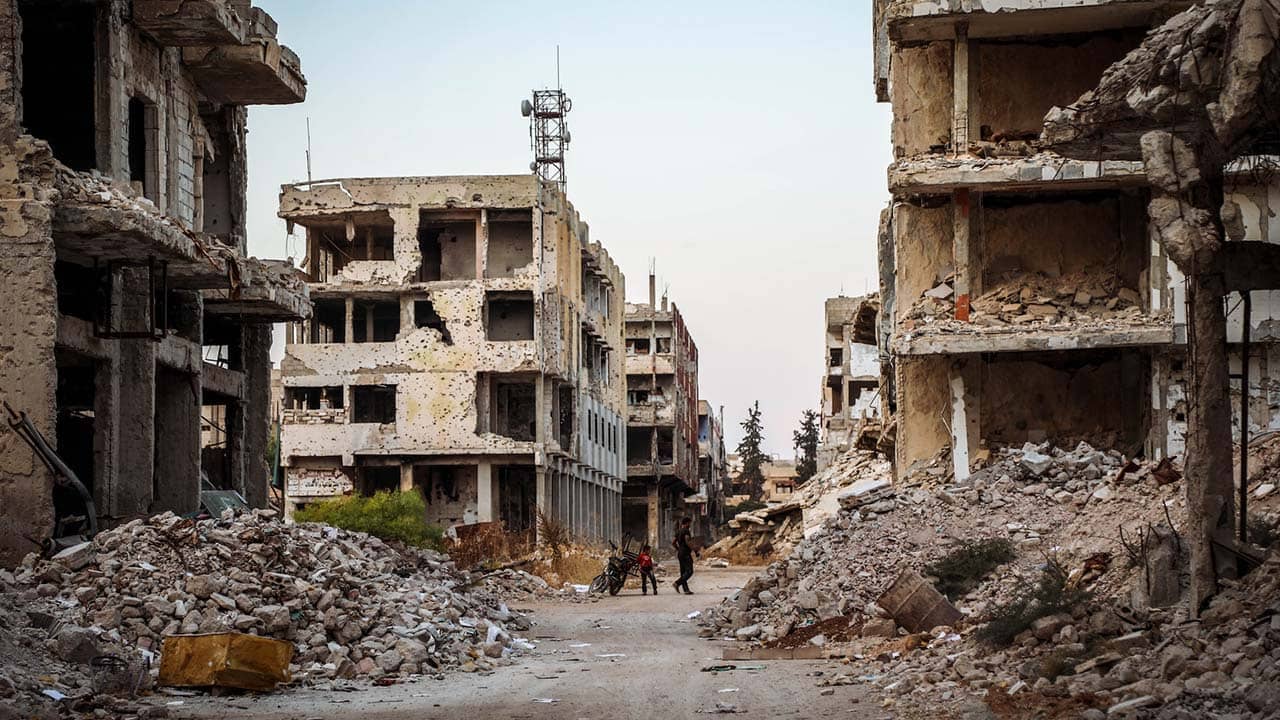Ukrainian International Criminal Justice Week
13-22 July 2022
New York/The Hague/Kiev
At the margins of International Justice Day, PGA participated in several important events focusing on the ongoing war in Ukraine to stand in solidarity with Ukrainian civil society and reiterate the importance of holding accountable perpetrators of the gravest crimes, including leaders responsible for the crime of aggression.
Ahead of the ministerial Ukraine Accountability Conference, PGA joined an NGO workshop on 13 July, which gathered civil society organizations from Ukraine and other ICC country situations to assess opportunities and discuss existing challenges in advancing accountability in the country. The recommendations identified at the end of the workshop were then presented by representatives of the Ukraine 5am Coalition and the ‘Tribunal for Putin Initiative’ (supported by PGA), who addressed the ministers during the 14 July Conference through a statement.
Opening of the Ukraine Accountability Conference – 14 July – The Hague
Following this event, which had important media coverage worldwide, the PGA Secretariat took part in the Ukrainian Week of International Criminal Justice – a series of events organized under the auspice of its partner, the Center for Civil Liberties (CCL). Taking stock of current achievements and remaining challenges to promote justice for Ukraine, PGA’s Secretary General, Dr. Donat Cattin, intervened on 19 July to explore current avenues for prosecuting the crime of aggression.
The crime of aggression: between UN broad definition and advantages of amending the Rome Statute - David Donat-Cattin, 19 July
On her side, Ms. Frederika Schweighoferova, Director of PGA’s Rome Statute Campaign, reflected on the current status of cooperation between Ukraine and the ICC. She made an analysis of the recently adopted legislation on cooperation between Ukraine and the ICC and assessed its strong features as well as suggested provisions to be further included, in line with PGA's draft law on cooperation. In addition, Frederika underlined the extensive work of PGA and its members in the country since 2014.
Cooperation with the ICC: Purpose, modalities, and why an effective domestic legislation is a key to its success – Frederika Schweighoferova, 22 July
Overview of PGA project in Ukraine and worldwide - Frederika Schweighoferova, 19 July
These events allowed PGA to reiterate that accountability for Ukraine is not an option: it is of utmost importance to optimize the international joint efforts to address the gravest crimes committed in its territory, especially the crime of aggression. The impunity that has surrounded the crime of aggression for many years and in several situation-countries has led to immense suffering, hundreds of victims, and acted as an incentive for the perpetration of more atrocities in Ukraine.
Affirming the principle of individual criminal responsibility for this crime must therefore be central to any accountability action. Leaders at the highest level involved in the commission of this crime, from its planning to its launching and execution, must be immediately prosecuted. In this regard, it is essential to underline the importance of issuing arrest warrants, which represent a significant measure of justice, as they target alleged perpetrators of the gravest crimes of concern to the international community and create incentives for defections and changes in the medium and long term.
Notwithstanding the relevant number of initiatives that seek to prosecute the crime of aggression either through domestic jurisdictions or by establishing a Special Criminal Tribunal, PGA strongly believes that accountability for such crime must be addressed by a competent international jurisdiction like the International Criminal Court, whereby the principle of irrelevance of official capacity can apply without procedural obstacles, such as immunities.
In this context, PGA developed a proposal to amend Article 15bis of the Rome Statute on the crime of aggression to align its jurisdictional regime with the other three core crimes under international law – at least to nationals of Non-State Parties to this treaty.
Proposal to Amend Article 15bis of the Rome Statute on the Crime of Aggression
Since March 2022, after consulting a group of prominent academic experts, PGA elaborated a non-paper containing specific amendments to Article 15bis of the Rome Statute that would partially align the ICC jurisdictional regime on the crime of aggression to the one that already exists for the other three core crimes.
Most importantly, the amendment would delete para. 15bis (5), which excludes the ICC's jurisdiction on the Crime of Aggression over non-party states. As such, it would enable the ICC to try individuals who are nationals of a non-party State, such as Russia, if they committed the crime of aggression on a territory of a State Party which has accepted the jurisdiction on the crime of aggression. This proposal would not affect the current status quo concerning the States Parties that have not accepted the jurisdiction over the crime of aggression.
If adopted by those States Parties to the Rome Statute that ratified the Kampala Amendments, such proposed amendments would be applicable from 17 July 2018 and binding for those States only. These States have the right to exceptionally invoke Art. 58 of the Vienna Convention on the Law of Treaties to ensure their immediate entry into force to realign the ICC jurisdictional regime on the crime of aggression to the object and purpose of the Statute itself, namely, to put an end to impunity for all the four core crimes under International Law. The PGA non-paper has been shared with the EU Member States and other concerned States that referred the situation in Ukraine to the ICC Prosecutor under Article 13(a) of the Rome Statute.
To ensure that the proposal would be considered and, as appropriate, adopted by the Assembly of States Parties held every year in December in The Hague or New York, the proposal for amendments must be presented by one or more State(s) Parties to the Rome Statute and circulated by the UN Secretary-General as a depository of the treaty as soon as possible, not later than the end of August of the particular year.
Impunity for the crime of aggression was effectively challenged after World War II when the International Community created an International Military Tribunal at Nuremberg in 1945 to adjudicate the main perpetrators of the Axis Powers that carried out the war of aggression. The time has come for the International Community to do the same in the face of the war of aggression in and against Ukraine, being executed by a Permanent Member of the UN Security Council that has so far been able to secure an “impunity zone” for its leaders, as it has already done in respect of mass atrocities committed in Syria.1
PGA strongly believes that the International Community and the Assembly of States Parties, consisting of the ICC Member States, must ensure an appropriate level of political support, cooperation, and financing for the ICC, which is competent for the investigation, prosecution, and adjudication of the most serious crimes of concern to the International Community as a whole. When the States Parties fulfill their responsibility as the Executive and Legislative branches within the Rome Statute system’s institutional design, the ICC judicial and prosecutorial organs will be able to maximize their impact and effectively serve as catalysts for domestic justice systems to counter and reduce impunity.
By enforcing the ICC’s mandate as a complementary court capable of initiating and leading proceedings against those bearing the greatest responsibility over the four international crimes,2 States can strive to achieve a better, more just, and more peaceful world.
---
Footnotes
1 The Russian Federation used its veto at least 15 times to block any meaningful decision within the UN Security Council to restore international peace and security in Syria. In May 2014, the Russian Federation and the People’s Republic of China vetoed a specific resolution referring the Syrian situation to the jurisdiction of the ICC that 13 States, including the USA, had supported. In June 2014, ISIS/ISIL/IS invaded Iraq and occupied the city of Mosul without finding any resistance or opposition from the Syrian army and its military allies, the Russian Federation, and the Islamic Republic of Iran. Since then, no international tribunal has had territorial jurisdiction over Syria, the leader of ISIS has been executed, and the leaders of Syria, the Russian Federation, and Iran have continued to operate in an “impunity zone.”
The failure to fight impunity sets a precedent that can incentivize the perpetration of atrocities in other situations and the repetition of other heinous crimes in the same situation. Therefore, the fight against impunity is an absolute imperative for deterrence in all situations (general prevention) and for prevention in a specific case to halt the repetition of international crimes, which contributes to maintaining and restoring international peace and security.
2 When the UN Security Council established the two ad hoc Tribunals for the former Yugoslavia and Rwanda in 1993 and 1994, respectively, it took note of the fact that relevant atrocities were taking place within the framework of internal conflicts and the disintegration or collapse of centralized States, hence not requiring the activation of jurisdiction on crimes against the peace/crime of aggression. Thus, the two ad hoc Tribunals’ Statutes were limited to three core crimes under International Law, namely genocide, crimes against humanity, and war crimes. However, all the preparatory documents relating to the establishment of a permanent International Criminal Court since the 1950s have always reflected the list of the four core crimes under International Law, including the crime of aggression, which reproduces the notion of crimes against peace contained in the London Agreement for the Nuremberg Tribunal and which the UN General Assembly affirmed as reflecting principles and norms of customary international law in 1946.




